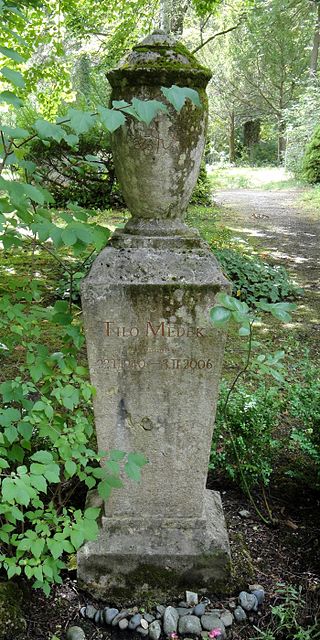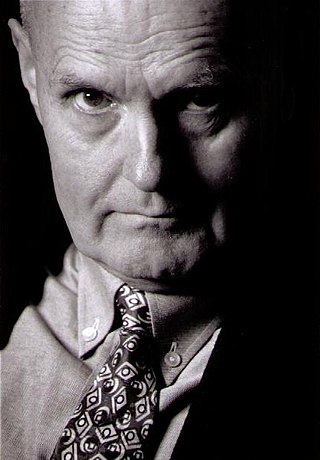
Hanns Eisler was a German-Austrian composer. He is best known for composing the national anthem of East Germany, for his long artistic association with Bertolt Brecht, and for the scores he wrote for films. The Hochschule für Musik Hanns Eisler Berlin is named after him.

Paul Dessau was a German composer and conductor. He collaborated with Bertolt Brecht and composed incidental music for his plays, and several operas based on them.
Friedrich Goldmann was a German composer and conductor.
Volkslied is a genre of popular songs in German which are traditionally sung. While many of them were first passed orally, several collections were published from the late 18th century. Later, some popular songs were also included in this classification.

Günter Kochan was a German composer. He studied with Boris Blacher and was a master student for composition with Hanns Eisler. From 1967 until his retirement in 1991, he worked as professor for musical composition at the Hochschule für Musik "Hanns Eisler". He taught master classes in composition at the Academy of Music and the Academy of Arts, Berlin. He was also secretary of the Music Section of the Academy of Arts from 1972 to 1974 and vice-president of the Association of Composers and Musicologists of the GDR from 1977 to 1982. Kochan is one of eleven laureates to have been awarded the National Prize of the GDR four times. In addition, he received composition prizes in the US and Eastern Europe. He became internationally known in particular for his Symphonies as well as the cantata Die Asche von Birkenau (1965) and his Music for Orchestra No. 2 (1987). His versatile oeuvre included orchestral works, chamber music, choral works, mass songs and film music and is situated between socialist realism and avant-garde.
Gruppe Neue Musik Hanns Eisler was an ensemble of musicians founded in 1970 in Leipzig with a focus on contemporary classical music, which played several world premieres and toured internationally. The ensemble disbanded in 1993.

Tilo Medek, originally Müller-Medek, was a German classical composer, musicologist and music publisher. He grew up in East Germany, but was inspired by the Darmstädter Ferienkurse. He composed radio plays and incidental music. His setting of Lenin's Decree on Peace led to restrictions, and after he showed solidarity with the expatriated Wolf Biermann, he also had to move to the West, where he composed an opera Katharina Blum based on Heinrich Böll's novel, and worked in education. He received international awards from 1967 onwards.

Sonja Kehler was a German actress and chanson singer, known internationally for her interpretation of works by Bertolt Brecht, first playing his characters on the theatre stage, then focused on singing his songs and those of others in solo programs. She also taught acting in Danish at the theatre academy in Odense, appeared in films, worked as stage director and presented literary programs.
Erik Wirl was a German operatic tenor and actor.
Wolf-Dieter Hauschild was a German conductor, choirmaster, artistic director, composer, harpsichordist and university lecturer.

Fritz Hennenberg is a German musicologist and dramaturg.
Günter Neubert was a German composer and tonmeister.
Kurt Hübenthal was a German operatic bass baritone, director and music teacher. He was professor for singing at the Hochschule für Musik Franz Liszt, Weimar.
Fritz Eberhardt Klemm was a German musicologist and journalist. He was one of the leading Hanns Eisler experts of the GDR.
The Hanns Eisler Prize was an East-German music award, named after the composer Hanns Eisler. It was awarded by Radio DDR – with advisory participation of the music section of the Akademie der Künste der DDR in Berlin (East) and the Verband der Komponisten und Musikwissenschaftler der DDR (VDK) – and on the occasion of his 70th birthday on 6 July 1968, the first time in the ballroom of the Alten Rathaus. The Hanns Eisler Prize was endowed with 10,000 marks and was one of the most renowned music prizes in the German Democratic Republic.

Eberhard Rebling was a German pianist, musicologist and dance scholar as well as an anti fascist.
Inge Lammel, née Rackwitz was a German women musicologist, which dealt mainly with industrial folk music. She fled to Great Britain as a Jew in 1939 and became known for her work on the persecution of the Jews during the period of National Socialism in Berlin-Pankow.
Paul Kurzbach was a German composer.
Robert Ehrlich is a Northern Irish recorder player and university professor. From October 2015 until 2019, he was rector of the Hochschule für Musik Hanns Eisler Berlin. Previously, he was rector of the University of Music and Theatre Leipzig from 2006 to 2015.







